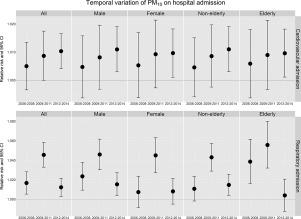Science of the Total Environment ( IF 9.8 ) Pub Date : 2020-07-01 , DOI: 10.1016/j.scitotenv.2020.140651 Arthit Phosri 1 , Tanasri Sihabut 1 , Chate Jaikanlaya 1

|
Short-term effects of ambient particulate matter (PM) on daily hospital admissions have been comprehensively elucidated, but very few studies evaluated the temporal variations of ambient PM associated with hospital admissions, especially in developing countries. This study aimed to explore the temporal changes of the short-term effects of PM10 on hospital admissions in Bangkok, Thailand from 2006 to 2014. The overdispersed Poisson regression model was applied to related daily PM10 concentrations to daily cardiovascular and respiratory hospital admissions by adjusting for temperature, humidity, long-term trend and seasonality, day of the week, public holiday, and population dynamics. The temporal variations of the effects of PM10 on hospital admissions were assessed by adding an interaction term between PM10 concentration and predefined time periods into the model. The relative risks per 10 μg/m3 increase in PM10 were 1.0092 (95% CI: 1.0046, 1.0138) for cardiovascular admissions at lag 0–3 day and 1.0209 (95% CI: 1.0145, 1.0273) for respiratory admissions at lag 0–7 day over the entire study period. Despite non-homogenous decreasing trends in annual PM10 concentrations during the study period, the effects of PM10 on cardiovascular and respiratory admissions remained significant and even showed an increasing trend for cardiovascular admissions. Specifically, the relative risks of cardiovascular admission per 10 μg/m3 increase in PM10 were 1.0050 (95% CI: 0.9965, 1.0135), 1.0086 (95% CI: 1.0000, 1.0174), and 1.0103 (95% CI: 1.0041, 1.0165) for the period of 2006–2008, 2009–2011, and 2012–2014, respectively (p-value for interaction <0.01). This finding indicated that estimated effects of PM10 on cardiovascular admissions significantly changed over time, speculating that the composition of PM10 might have changed and introduced the alterations of overall toxicity of PM10. Therefore, the efforts on air pollution control need to be continued to reduce health effects of PM10 in the future.


























 京公网安备 11010802027423号
京公网安备 11010802027423号